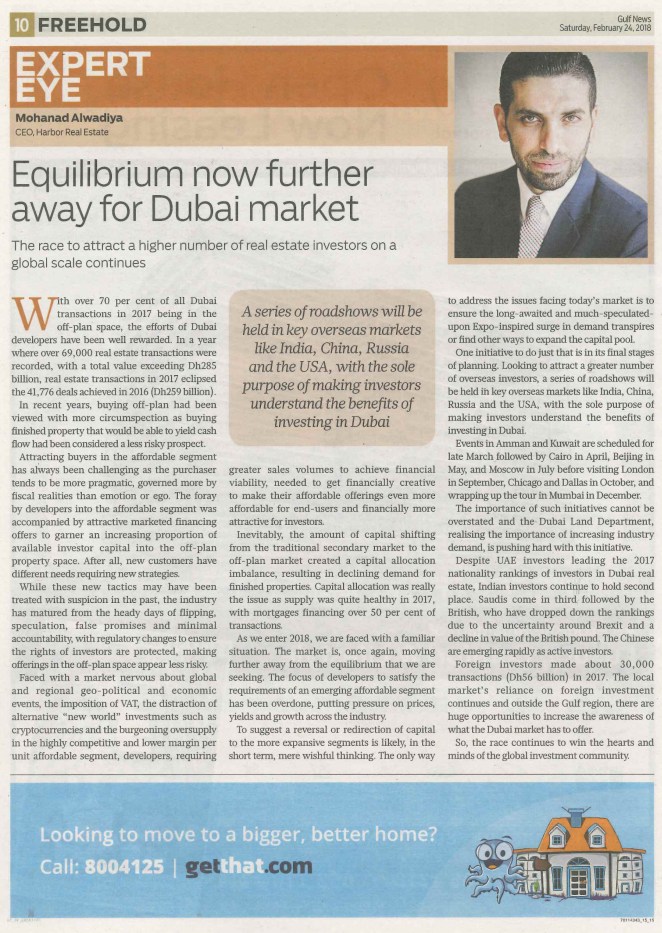Most of us have been witnessing the considerable construction efforts that have been underway in completing the Dubai Water Canal project. With an impending completion date of 2017, the canal which will run from Business Bay into the Arabian Gulf and include four hotels. An estimated 450 restaurants, new luxury housing developments, waterfront developments and extensive public spaces, this latest addition to the ever-changing Dubai landscape is the latest stunning achievement by the emirate.
While many people will marvel at the imagination and sheer scale of the project, very few will comprehend what a wide variety of benefits such a project brings to the emirate of Dubai, especially those which relate to the Real Estate industry.
For a start, the investment in the local economy will top 2 billion dirhams. Projects of this scale are of huge benefit to the local economy and the prosperity that is generated among businesses is essential to maintaining economic vibrancy and, logically, the demand for commercial real estate as well as residential real estate for those who are involved, contracted or employed to bring the project to its conclusion.
Then, of course, is the added value that the project itself brings to the real estate that borders the actual canal itself. Property developments situated on both banks of the canal will be comprised of over 5,000 residential units in addition to over 900 hotel rooms. The addition of these properties to the city’s “balance sheet” in the form of a new upmarket residential community and tourist destination situated in such a prime location are sure to grow in value, especially as the estimated 80,000 square meters of leisure areas, public places and facilities are completed.
The waterfront development will enable a lifestyle that will be the envy of many. Residents will enjoy a 5-kilometre boardwalk which will boast a vast array of food, beverage and retail outlets and tourists will participate in the vibrancy and excitement of what is sure to become a favoured destination for many. Running tracks, viewing areas and marinas will only add to the appeal of an already famous Jumeriah district which will be further enhanced with the re-opening of the Jumeriah Beach Park.
However, it is not just the waterfront properties that will benefit from an upward value adjustment. Any property which is within an easy walking distance of the waterfront attraction or newly reopened beachfront will reap the inevitable rewards of being located within proximity to the latest attraction in Dubai. Those existing owner occupiers living close to the canal, who have been affected by the projects construction, will reap the rewards of their patience and tolerance with the sharp increase of the values of their properties.
Meanwhile, the project will help ensure that tourism will continue to play its part in driving Dubai’s economic growth. This project is just one of a slew of new projects to grow this important revenue generating economic segment. Predicted by Mastercard’s Global Destination Cities Index to be the 4th most popular destination in the world by year end, Dubai will have welcomed almost 16 million overnight visitors in the by the close of 2016. This will represent a 12% increase over 2015 and continue a trend of approximately 10% per annum since 2010. The canal project represents just one more compelling reason to visit Dubai and the requirement for real estate to support the commercial activities that tourism will give rise to is only bound to increase.
And of course, all that increased tourism will require people to service it. They, in turn, will require accommodation. Such mega projects have definite effects the population growth of the emirate and population growth is the pre-requisite to real estate and property industry growth. This is where the Dubai economy has an advantage over many western economies in that, looking forward, there is a requirement for intellectual and human capital which is not residing dormant and unutilised in the economy and attracting this critical resource can only result adding to economic growth, providing additional impetus for Dubai’s Real Estate industry to enjoy the predictable surge in demand for accommodation and commercial space of all types, from labor camps to offices to warehouses to apartments to executive Villas. That demand, however, can only be created with the incremental economic activity that the initiatives such as the Canal project can provide.
Investors are already showing lots of interest in the project which is not surprising. Other projects that have been developed with a water based lifestyle theme such as The Palm, Dubai Marina and the adjacent Jumeriah Beach residences have done remarkably well and proven popular with both local and overseas investors. They all share one common characteristic … they offer wonderful lifestyles and the Canal project will be no different. The project is already demonstrating significant potential to satisfy the appetite for investment returns and the fundamental reasoning is compelling.






